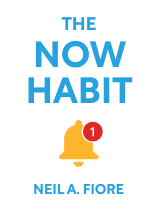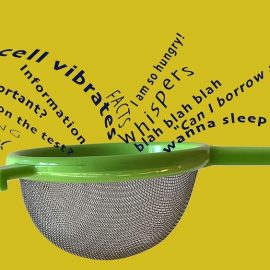

This article is an excerpt from the Shortform book guide to "The Now Habit" by Neil A. Fiore. Shortform has the world's best summaries and analyses of books you should be reading.
Like this article? Sign up for a free trial here.
Do you find it difficult to resist distractions and get your mind to focus on the task at hand? What is the secret to sustained focus?
When your mind is scattered, getting it to focus might seem like a tall order. According to Neil Fiore, the author of The Now Habit, the first step to getting into the zone of sustained focus is to get into a flow state.
Here are three tips to stay focused and keep distractions at bay.
Tip 1: Get Into a Flow State
Fiore argues that you can avoid procrastination and work more efficiently if you get into a flow state—a state of enhanced calm, concentration, creativity, and ease. You can enter a flow state by performing focusing and relaxation exercises before starting a work session. Fiore gives detailed instructions for the exercises, which combine deep breathing, mindfulness techniques, and positive affirmations. (Shortform note: It might not always be possible to create flow on demand. For example, in Flow, Mihaly Csikszentmihalyi (the psychologist who introduced the concept of flow states) argues that in some cases, you might need to change jobs in order to find work that triggers flow for you.)
Tip 2: Keep Distractions at Bay
To help you concentrate and get into a flow state, Fiore recommends having a plan to deal with distractions as they arise. He argues that most distractions can be handled the same way: Write down the distracting thought or impulse and get back to work. That way, you don’t procrastinate on one task by doing another, but you also don’t forget to do genuinely important things later. He says the one exception to this technique is strong emotions, which might require you to take a few minutes to sort through your feelings before returning to work.
| Tips to Stay Focus and Say “No” to Distractions It might not be as easy to simply dismiss distractions as Fiore suggests. In A Mind For Numbers, Barbara Oakley defines procrastination as a habit: When we encounter certain cues, we perform a behavioral routine (for example, browsing social media) which gives us a reward (such as relief from work-related anxiety) that reinforces the routine. Oakley agrees with Fiore that one of the cues in this behavioral cycle is our anticipation that work will be painful—but she adds that distractions themselves are also a powerful cue for procrastination. That’s because over time, the habit of anxiety continuously rewards us for following rather than ignoring distractions—and that’s a hard association to break. That’s why Oakley recommends avoiding distractions altogether when you can. For example, if you tend to get distracted by your smartphone, Oakley says that you can deliberately work in places where you don’t get cell reception or wifi. |
Tip 3: Anticipate Procrastination
Finally, Fiore recommends tackling resistance in advance by mentally rehearsing before you get to work—in other words, visualize what you plan to work on as well as the resistance and distractions you expect to face. This way, Fiore says, you can come up with strategies for overcoming resistance and distraction ahead of time and you’ll be prepared when these obstacles come up.
(Shortform note: One way to anticipate procrastination and avoid it is by forming what Nir Eyal calls precommitments—choices you make in the present that guide your behavior in the future. For example, if you know what sites you tend to visit when procrastinating, you can install apps that will automatically block those sites during work hours. This is a precommitment because you’re making a choice now that will prevent you from making an undesirable choice later.)

———End of Preview———
Like what you just read? Read the rest of the world's best book summary and analysis of Neil A. Fiore's "The Now Habit" at Shortform.
Here's what you'll find in our full The Now Habit summary:
- Why people tend to put off the things that matter the most
- Where procrastination stems from, and why it doesn't mean you're lazy
- How to get more done while still maintaining a balanced life






